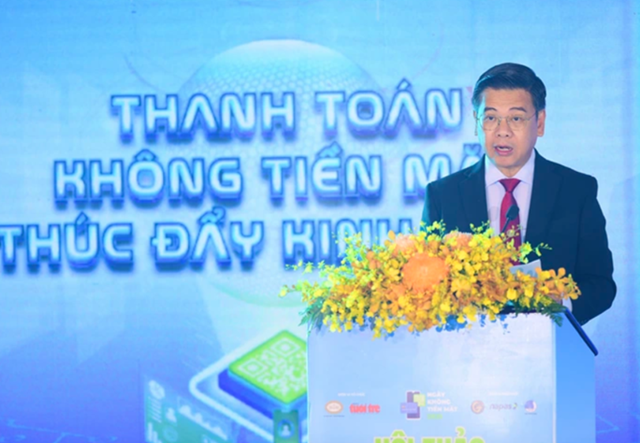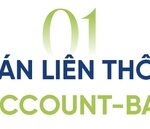
Deputy Prime Minister Ho Duc Phoc shared at the workshop on the morning of 06/14/2025
|
At the workshop “Cashless Payment: A Driver for Digital Economy Growth” held on the morning of June 14, 2025, Deputy Prime Minister Ho Duc Phoc shared that the development of e-commerce naturally leads to cashless payments. Cashless payments are fast and efficient, taking only a few seconds, and they also enhance transparency in fund flows, boosting the growth of the digital economy.
Cashless payments not only improve the efficiency of the banking sector but also enhance financial management transparency, support e-commerce and public services, increase labor productivity, and reduce social costs.
According to statistics from the State Bank of Vietnam (SBV), by the end of 2024, Vietnam had over 204.5 million payment accounts of individual customers and 154.1 million bank cards in circulation. Nearly 87% of adults have bank accounts.
Cashless payments have penetrated all sectors of the economy and social life, including school fees, hospital fees, and shopping.
Along with the outstanding results that the banking sector has achieved in developing cashless payments, contributing to the growth of the digital economy, the Deputy Prime Minister frankly admitted that there are some issues regarding network security and personal data protection in digital payments, especially in the context of increasingly sophisticated high-tech crimes.
Therefore, it is necessary to improve the institutional framework and policies to facilitate innovative payment models while ensuring risk management and system safety to protect people’s assets.
Transaction security is a major obstacle to cashless payments.
 Mr. Nguyen Van Dung – Vice Chairman of HCMC People’s Committee
|
Mr. Nguyen Van Dung, Vice Chairman of the HCMC People’s Committee, shared that cashless payments have become an objective trend and are widely accepted in today’s life. This trend is easily observable in many places such as stores, cafes, and various cashless transaction activities. This is a significant effort to encourage people to adopt a cashless habit…
Regarding Ho Chi Minh City, Mr. Dung stated that the city has issued a plan to promote cashless payments with multiple measures and solutions to boost digital payments in all fields of public services, education, healthcare, transportation, and trade promotion activities. Along with these, there are synchronized solutions to enhance communication and improve digital financial knowledge for citizens, creating a solid foundation for a cashless society.
However, based on the practical implementation in Ho Chi Minh City, there are still certain difficulties and limitations in realizing cashless payments. Among them, transaction security for users is one of the obstacles that make people hesitant to adopt this method, especially amid the increasingly sophisticated and complex context of high-tech crimes, fraud, and personal data theft.
Nevertheless, to deeply and extensively implement cashless payments, coordination among levels and sectors is indispensable. The Vice Chairman of the HCMC People’s Committee proposed several suggestions for further promoting cashless payments:
First, the government should direct central ministries and sectors to continue improving legal regulations related to cashless payments, ensuring consistency with the Law on Credit Institutions amended in 2024, Decree 52, and regulations on information security and personal data protection, thereby creating a synchronous legal corridor for payment activities.
Second, it is recommended that state management agencies and experts discuss and share experiences in promoting digital payments in e-commerce, the role of data connection solutions in boosting the digital economy, and specific recommendations for Ho Chi Minh City.
Third, departments, branches, and People’s Committees of wards and communes should proactively review and integrate content to promote cashless payments into their regular work programs. Focus on synchronously implementing solutions to enhance electronic payments in public services, especially in administration, education, healthcare, transportation, taxes, and fees, ensuring convenient and secure payment procedures.
Ho Chi Minh City also proposed solutions to support businesses, business households, traders, and people in applying suitable digital payment solutions according to their scale and actual conditions.
At the same time, it is necessary to promote communication on various platforms to raise awareness and skills in using cashless payments among the people and encourage changing the habit of using cash in the community, especially in residential areas, traditional markets, and outlying districts.
Fourth, units such as the State Bank of Vietnam (SBV) – Branch 2 and departments should coordinate with central ministries and sectors to interconnect data between industries and fields, forming a smart payment ecosystem in the city.
Cashless payments will continue to be an important driver of the digital economy, contributing to building a more modern, efficient, and equitable society.
– 13:21 06/14/2025
“How to Boost Digital Payments”
“At the seminar “Cashless Payment: A Driver for Digital Economic Growth,” held on the morning of June 14, 2025, experts proposed solutions to promote the growth of digital payments amid ongoing challenges and barriers.
“Bank Cards to Become the ‘Key’ to Accessing All Services, from Transportation and Healthcare to Education and Commerce.”
Imagine a day when all it takes is a tap of your NAPAS card, a scan of your VietQR code, or a flash of your phone to seamlessly travel from bus to metro and even rent a bike. This is the future of transportation that NAPAS is working towards, and it’s closer than you think.





















